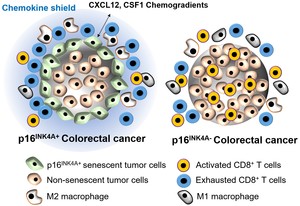
[이코노믹리뷰=곽예지 기자] Researchers in Korea have discovered the existence of a chemical barrier that protects cancer cells from attack by immune cells.
By revealing the existence of a barrier that prevents the penetration of immune cells into the tumor, it is expected to be a clue to complement the low reactivity of the immune anticancer drugs that attack cancer cells with immune cells.
The Korea Research Foundation has created a favorable environment for the progression of colon cancer by the research team of Professor Tae-Jun Park, Jang-hee Kim, and Yong-won Choi of Ajou University School of Medicine. It was revealed on the 7th that it was confirmed.
Although senescent cells have stopped dividing, metabolic activity is active, and various substances are secreted, and changes in the microenvironment due to this have been reported in various diseases.
The existence of these senescent tumor cells is known in advanced cancer, but its effect on the progression of cancer is not well known.
The research team confirmed the presence of senescent tumor cells in the colon cancer tissue resected by surgery, and further observed that the invasion of immune cells (cytotoxic T cells) attacking cancer cells slowed down in tissues with more senescent tumor cells.
To find out the cause, secretions found on the surface of senescent tumor cells were investigated using genetic analysis and immunohistochemical staining, and as a result, two types of cytokines that cause immune cell function decline were identified.
It was demonstrated that CXCL12, a kind of chemokine, inhibits the invasion of cytotoxic T cells into tumors, and CSF1, a cytokine, promotes the differentiation of macrophages that induces immunosuppression, resulting in a decrease in the function of cytotoxic T cells.
In fact, in the colon cancer mouse model in which senescent tumor cells exist, inhibition of the chemokine CXCL12 alone increased the penetration of cytotoxic T cells into the tumor and significantly suppressed the tumor.
In addition, when suppressing the secretion of both cytokines at the same time, it was observed that the size of the tumor decreased significantly in the colon cancer mouse model that did not respond to the immune anticancer drug, confirming the possibility of improving the responsiveness of the immune anticancer drug through the control of senescent tumor cells.
By revealing that senescent tumor cells present in colorectal cancer may be involved in the progression of cancer, it will be the beginning of a new treatment strategy that targets aging tumor cells or aging-related secretions for the treatment of colorectal cancer with low immune anticancer drug reactivity. It is expected.
Meanwhile, the results of this research, supported by the Ministry of Education and the Korea Research Foundation, were published on January 4 in the international academic journal Advanced Science.
